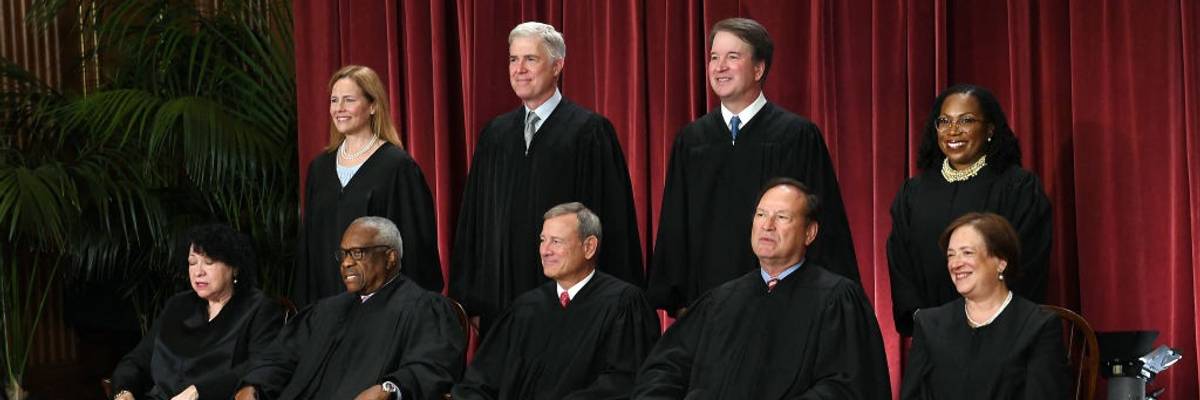
Justices of the US Supreme Court pose for their official photo at the Supreme Court in Washington, D.C. on October 7, 2022.
Why SCOTUS’ Code of Conduct Fails to Address Corruption
By issuing this toothless code of conduct, the Supreme Court attempts to circumvent necessary reforms and enables more lavish gifts and lucrative speaking engagements from their wealthy patrons.
After months of ethics scandals and scrutiny from advocates, the U.S. Supreme Court released a code of conduct on November 15, with all nine justices signing on. According to the opening statement, the justices wanted to allegedly dispel a “misunderstanding that the justices of this Court, unlike all other jurists in this country, regard themselves as unrestricted by any ethics rules.”
But the code isn’t fostering understanding; it’s a mere facade, a paper-thin veiled attempt at responsibility that ultimately serves as nothing more than a PR stunt in the guise of genuine accountability. Once rumored ethical concerns have now become regular fixtures in national headlines about clear ethics violations. Deep investigations by multiple outlets have revealed a pattern and practice of questionable behavior. Congress must see through this stunt, conduct a thorough investigation, and enact binding, enforceable federal legislation covering ethics reform and court expansion.
SCOTUS Justices Are Not Sorry About Corruption. They’re Sorry They Got Caught
It’s not a surprise that the code arrives just as the Senate Judiciary Committee is debating subpoenas for Harlan Crow, who has given millions of dollars in gifts to Clarence Thomas, and Leonard Leo, whose wealth influenced a far-right takeover of the court. Public opinion of the court is at historic lows. Congress is responding to public pressure and finally considering action on ethics reform. By issuing this toothless code of conduct, the Supreme Court attempts to circumvent necessary reforms and enables more lavish gifts and lucrative speaking engagements from their wealthy patrons.
Highest Court with the Lowest Ethics Standards
The justices claim they adapted their new code of conduct from rules governing judges lower on the federal bench. But there is a key and glaring difference: The justices make the provisions of their code discretionary, thus enabling the Supreme Court to be the only federal entity not subject to an enforceable ethical code of conduct. Justices further skirt addressing conflicts of interest, misconduct, and when recusal is necessary.
The unenforceable code relies not on congressional or executive branch oversight, but on the justices’ self-reporting and self-regulation. It does not address donor influence or failure to disclose gifts over a specified amount. It leaves recusal for conflicts of interest up to individual justices. There are no procedures for public complaints or any formal reviews or investigations of rule-breaking. In contrast, the lower courts’ rules have multiple references to enforcement and disciplinary procedures, and Bloomberg even suggests that non-SCOTUS justices “divest from financial interests ‘that might require frequent disqualification.’”
We Already Have the Blueprint for a Better Court
Congress cannot continue to allow the Supreme Court to act as conduits for far-right billionaires. We must instead issue common-sense reforms to end the blatant corruption and mitigate the decades of far-right takeover. Luckily, we already have the blueprint.
First, the Senate Judiciary Committee must issue subpoenas to Harlan Crow and Leonard Leo and thoroughly investigate the ethics violations. The U.S. public has a right to know the extent of judicial misconduct and the influence of far-right megadonors on the Supreme Court’s business.
Second, Congress must pass a binding, enforceable Supreme Court ethics bill that outlines clear rules regarding recusals, gifts, and conflicts of interest. The legislation must also outline specific consequences if justices break the code and the body charged with investigating misconduct. Several ethics bills are already being considered, including the Supreme Court Ethics, Recusal, and Transparency Act (SCERT), marked up by the Senate Judiciary Committee earlier this year.
Congress must see through this stunt, conduct a thorough investigation, and enact binding, enforceable federal legislation covering ethics reform and court expansion.
Finally, Congress must rebalance the court by passing the Judiciary Act and adding four seats. Court expansion is the simplest and most effective way to undo decades of conservative court-packing and the far-right takeover of the courts. The Judiciary Act, sponsored by Representative Hank Johnson in the House and Senator Ed Markey in the Senate, already has 65 cosponsors. The ethics crisis is a symptom of deeper institutional rot that can only be fixed through rebalancing the court.
Public pressure to stop this ethics circus is mounting. A Morning Consult poll found 3 in 4 voters support a binding ethics code. Likewise, a Demand Justice commissioned YouGov poll found that 59% of Americans are less likely to “support a congressional candidate who opposes ethics reform at the Supreme Court.” While Justice Samuel Alito claims that congressional oversight of Supreme Court ethics is unconstitutional, he ignores hundreds of years of precedent. There’s a lot of work to do, but momentum and precedent are on our side.
Congress cannot continue to sit back and let the ultraconservative Supreme Court dictate national policy at the behest of their far-right patrons. Now is the time to do their duty, rein in the court’s corruption, and undo the far-right court packing that’s wreaked havoc on our democratic systems.
An Urgent Message From Our Co-Founder
Dear Common Dreams reader, The U.S. is on a fast track to authoritarianism like nothing I've ever seen. Meanwhile, corporate news outlets are utterly capitulating to Trump, twisting their coverage to avoid drawing his ire while lining up to stuff cash in his pockets. That's why I believe that Common Dreams is doing the best and most consequential reporting that we've ever done. Our small but mighty team is a progressive reporting powerhouse, covering the news every day that the corporate media never will. Our mission has always been simple: To inform. To inspire. And to ignite change for the common good. Now here's the key piece that I want all our readers to understand: None of this would be possible without your financial support. That's not just some fundraising cliche. It's the absolute and literal truth. We don't accept corporate advertising and never will. We don't have a paywall because we don't think people should be blocked from critical news based on their ability to pay. Everything we do is funded by the donations of readers like you. Will you donate now to help power the nonprofit, independent reporting of Common Dreams? Thank you for being a vital member of our community. Together, we can keep independent journalism alive when it’s needed most. - Craig Brown, Co-founder |
After months of ethics scandals and scrutiny from advocates, the U.S. Supreme Court released a code of conduct on November 15, with all nine justices signing on. According to the opening statement, the justices wanted to allegedly dispel a “misunderstanding that the justices of this Court, unlike all other jurists in this country, regard themselves as unrestricted by any ethics rules.”
But the code isn’t fostering understanding; it’s a mere facade, a paper-thin veiled attempt at responsibility that ultimately serves as nothing more than a PR stunt in the guise of genuine accountability. Once rumored ethical concerns have now become regular fixtures in national headlines about clear ethics violations. Deep investigations by multiple outlets have revealed a pattern and practice of questionable behavior. Congress must see through this stunt, conduct a thorough investigation, and enact binding, enforceable federal legislation covering ethics reform and court expansion.
SCOTUS Justices Are Not Sorry About Corruption. They’re Sorry They Got Caught
It’s not a surprise that the code arrives just as the Senate Judiciary Committee is debating subpoenas for Harlan Crow, who has given millions of dollars in gifts to Clarence Thomas, and Leonard Leo, whose wealth influenced a far-right takeover of the court. Public opinion of the court is at historic lows. Congress is responding to public pressure and finally considering action on ethics reform. By issuing this toothless code of conduct, the Supreme Court attempts to circumvent necessary reforms and enables more lavish gifts and lucrative speaking engagements from their wealthy patrons.
Highest Court with the Lowest Ethics Standards
The justices claim they adapted their new code of conduct from rules governing judges lower on the federal bench. But there is a key and glaring difference: The justices make the provisions of their code discretionary, thus enabling the Supreme Court to be the only federal entity not subject to an enforceable ethical code of conduct. Justices further skirt addressing conflicts of interest, misconduct, and when recusal is necessary.
The unenforceable code relies not on congressional or executive branch oversight, but on the justices’ self-reporting and self-regulation. It does not address donor influence or failure to disclose gifts over a specified amount. It leaves recusal for conflicts of interest up to individual justices. There are no procedures for public complaints or any formal reviews or investigations of rule-breaking. In contrast, the lower courts’ rules have multiple references to enforcement and disciplinary procedures, and Bloomberg even suggests that non-SCOTUS justices “divest from financial interests ‘that might require frequent disqualification.’”
We Already Have the Blueprint for a Better Court
Congress cannot continue to allow the Supreme Court to act as conduits for far-right billionaires. We must instead issue common-sense reforms to end the blatant corruption and mitigate the decades of far-right takeover. Luckily, we already have the blueprint.
First, the Senate Judiciary Committee must issue subpoenas to Harlan Crow and Leonard Leo and thoroughly investigate the ethics violations. The U.S. public has a right to know the extent of judicial misconduct and the influence of far-right megadonors on the Supreme Court’s business.
Second, Congress must pass a binding, enforceable Supreme Court ethics bill that outlines clear rules regarding recusals, gifts, and conflicts of interest. The legislation must also outline specific consequences if justices break the code and the body charged with investigating misconduct. Several ethics bills are already being considered, including the Supreme Court Ethics, Recusal, and Transparency Act (SCERT), marked up by the Senate Judiciary Committee earlier this year.
Congress must see through this stunt, conduct a thorough investigation, and enact binding, enforceable federal legislation covering ethics reform and court expansion.
Finally, Congress must rebalance the court by passing the Judiciary Act and adding four seats. Court expansion is the simplest and most effective way to undo decades of conservative court-packing and the far-right takeover of the courts. The Judiciary Act, sponsored by Representative Hank Johnson in the House and Senator Ed Markey in the Senate, already has 65 cosponsors. The ethics crisis is a symptom of deeper institutional rot that can only be fixed through rebalancing the court.
Public pressure to stop this ethics circus is mounting. A Morning Consult poll found 3 in 4 voters support a binding ethics code. Likewise, a Demand Justice commissioned YouGov poll found that 59% of Americans are less likely to “support a congressional candidate who opposes ethics reform at the Supreme Court.” While Justice Samuel Alito claims that congressional oversight of Supreme Court ethics is unconstitutional, he ignores hundreds of years of precedent. There’s a lot of work to do, but momentum and precedent are on our side.
Congress cannot continue to sit back and let the ultraconservative Supreme Court dictate national policy at the behest of their far-right patrons. Now is the time to do their duty, rein in the court’s corruption, and undo the far-right court packing that’s wreaked havoc on our democratic systems.
- 'Important First Step': Durbin Moves to Subpoena Rich Benefactors of Alito, Thomas ›
- AOC Leads Call for DOJ Probe of Clarence Thomas Over 'Blatant Disregard for Judicial Ethics' ›
- In 'Toothless PR Stunt,' Supreme Court Publishes Ethics Code With No Enforcement Mechanisms ›
- The US Supreme Court Has a Very Serious Clarence Thomas Problem ›
- Most US Voters Want Stricter Supreme Court Ethics Code ›
After months of ethics scandals and scrutiny from advocates, the U.S. Supreme Court released a code of conduct on November 15, with all nine justices signing on. According to the opening statement, the justices wanted to allegedly dispel a “misunderstanding that the justices of this Court, unlike all other jurists in this country, regard themselves as unrestricted by any ethics rules.”
But the code isn’t fostering understanding; it’s a mere facade, a paper-thin veiled attempt at responsibility that ultimately serves as nothing more than a PR stunt in the guise of genuine accountability. Once rumored ethical concerns have now become regular fixtures in national headlines about clear ethics violations. Deep investigations by multiple outlets have revealed a pattern and practice of questionable behavior. Congress must see through this stunt, conduct a thorough investigation, and enact binding, enforceable federal legislation covering ethics reform and court expansion.
SCOTUS Justices Are Not Sorry About Corruption. They’re Sorry They Got Caught
It’s not a surprise that the code arrives just as the Senate Judiciary Committee is debating subpoenas for Harlan Crow, who has given millions of dollars in gifts to Clarence Thomas, and Leonard Leo, whose wealth influenced a far-right takeover of the court. Public opinion of the court is at historic lows. Congress is responding to public pressure and finally considering action on ethics reform. By issuing this toothless code of conduct, the Supreme Court attempts to circumvent necessary reforms and enables more lavish gifts and lucrative speaking engagements from their wealthy patrons.
Highest Court with the Lowest Ethics Standards
The justices claim they adapted their new code of conduct from rules governing judges lower on the federal bench. But there is a key and glaring difference: The justices make the provisions of their code discretionary, thus enabling the Supreme Court to be the only federal entity not subject to an enforceable ethical code of conduct. Justices further skirt addressing conflicts of interest, misconduct, and when recusal is necessary.
The unenforceable code relies not on congressional or executive branch oversight, but on the justices’ self-reporting and self-regulation. It does not address donor influence or failure to disclose gifts over a specified amount. It leaves recusal for conflicts of interest up to individual justices. There are no procedures for public complaints or any formal reviews or investigations of rule-breaking. In contrast, the lower courts’ rules have multiple references to enforcement and disciplinary procedures, and Bloomberg even suggests that non-SCOTUS justices “divest from financial interests ‘that might require frequent disqualification.’”
We Already Have the Blueprint for a Better Court
Congress cannot continue to allow the Supreme Court to act as conduits for far-right billionaires. We must instead issue common-sense reforms to end the blatant corruption and mitigate the decades of far-right takeover. Luckily, we already have the blueprint.
First, the Senate Judiciary Committee must issue subpoenas to Harlan Crow and Leonard Leo and thoroughly investigate the ethics violations. The U.S. public has a right to know the extent of judicial misconduct and the influence of far-right megadonors on the Supreme Court’s business.
Second, Congress must pass a binding, enforceable Supreme Court ethics bill that outlines clear rules regarding recusals, gifts, and conflicts of interest. The legislation must also outline specific consequences if justices break the code and the body charged with investigating misconduct. Several ethics bills are already being considered, including the Supreme Court Ethics, Recusal, and Transparency Act (SCERT), marked up by the Senate Judiciary Committee earlier this year.
Congress must see through this stunt, conduct a thorough investigation, and enact binding, enforceable federal legislation covering ethics reform and court expansion.
Finally, Congress must rebalance the court by passing the Judiciary Act and adding four seats. Court expansion is the simplest and most effective way to undo decades of conservative court-packing and the far-right takeover of the courts. The Judiciary Act, sponsored by Representative Hank Johnson in the House and Senator Ed Markey in the Senate, already has 65 cosponsors. The ethics crisis is a symptom of deeper institutional rot that can only be fixed through rebalancing the court.
Public pressure to stop this ethics circus is mounting. A Morning Consult poll found 3 in 4 voters support a binding ethics code. Likewise, a Demand Justice commissioned YouGov poll found that 59% of Americans are less likely to “support a congressional candidate who opposes ethics reform at the Supreme Court.” While Justice Samuel Alito claims that congressional oversight of Supreme Court ethics is unconstitutional, he ignores hundreds of years of precedent. There’s a lot of work to do, but momentum and precedent are on our side.
Congress cannot continue to sit back and let the ultraconservative Supreme Court dictate national policy at the behest of their far-right patrons. Now is the time to do their duty, rein in the court’s corruption, and undo the far-right court packing that’s wreaked havoc on our democratic systems.
- 'Important First Step': Durbin Moves to Subpoena Rich Benefactors of Alito, Thomas ›
- AOC Leads Call for DOJ Probe of Clarence Thomas Over 'Blatant Disregard for Judicial Ethics' ›
- In 'Toothless PR Stunt,' Supreme Court Publishes Ethics Code With No Enforcement Mechanisms ›
- The US Supreme Court Has a Very Serious Clarence Thomas Problem ›
- Most US Voters Want Stricter Supreme Court Ethics Code ›

